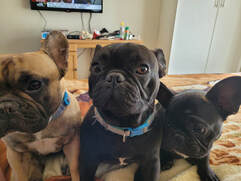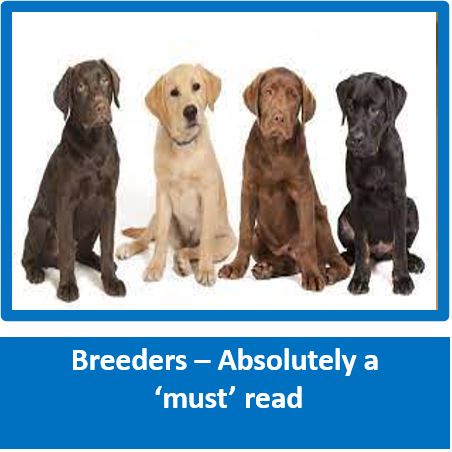French Bulldog - Frenchie - Common Behaviour Problems
Friends of the Dog
Friends of the Dog

Like all dogs, Frenchie’s, as they are more commonly called, can have behaviour problems, especially if they did not receive the early, and crucial socialization in the early weeks of 3 – 16 weeks and the owner did not put in their own Do’s and Don’ts’s right from the beginning.
These are gorgeous little dogs and can make wonderful companions, however, there are certain physical issues associated with them due to them being part of the Brachycephalic group of dogs. These are dogs that have short muzzles and a flattened face so snoring and strange noises often the norm. If you are considering getting one, do speak to your vet to find out the related physical conditions that can occur.
The most common behaviour concerns that are noted are below:
Toilet training - it is said that they are hard to train when it comes to toilet training and can take longer than other breeds. However, we have not found this problem ourselves if positive reinforcement methods, consistency, routines and patience is used by the owner. Of course, there could always be the odd accident – if this does occur, dap with paper towels, wash with 1/3 white vinegar to 2/3-part water, to which you can add a few drops of Citronella oil – never use household cleaning products. Many of these contain ammonia, which is present in dog urine, and will make the soiled area smell even more like a toilet.
When taking the dog outside to eliminate, try using just one place, and as close to the home as possible, with easy access. This then becomes the dog’s toilet, and you are a lot less likely to have landmines all over the garden, and the habit of going to only one place is reinforced, and accidents less likely to occur.
With a young pup you should always pick it up and take it to the toilet until a bit older when the sphincter muscle has developed, and the pup can manage to hold its elimination for a while – this is normally at about 16 weeks of age in some cases, so even after you no longer carry the pup, do ensure it can get to the designated area very quickly.
If you do have a situation whereby you have left the pup in its playpen or secure area, then ensure that the puppy pads or substrate you are using for elimination purposes is close by. We have also found that if the owner sticks to a strict routine, such as potty time after waking, after eating and drinking, after playing etc, they are much easier to train. They adore praise and their owners attention, so praise lavishly when the pup does eliminate in the correct area, and pop them a treat at the same time – double reinforcement!
Training - They are a breed that is known to be stubborn at times, and have a mind of their own, so the trick with standard training is to keep the time periods of training basic exercises very short, fun, and rewarding, with lots of praise and treats. If you do call him and he ignores you, don’t keep on calling him – rather say HUMPH! and stomp away and ignore him in return. If he does now come to you, ignore him (you did not ask him to come), take a few steps and then call him again. This time, as he comes, praise lavishly and if you have treats nearby, give him 2 or 3 – he will soon realize what behaviour works and what doesn’t!
Other behaviours that are said to be common to the breed are the following:-
Separation Anxiety, demanding behaviour and being very clingy – common to many breeds, and unfortunately the reason that dogs do develop these behaviour concerns, is because we give into them, give them far too much attention and make them dependent on our presence – yes, we know they are adorable, but if we teach them to have confidence right from the beginning, then these problems simply don’t occur, and the result is a well balanced and well adjusted little dog.
Right from the second your pup comes home, don’t go overboard with giving attention, picking them up, loving them and so on. We are not saying don’t love them, of course you do, but don’t go overboard about it. Ideally, get them into the routine they are going to have when you are at work – the more you have them with you, the more dependant on you they will become.
Teach your Frenchie, right from the beginning to lie in its crate with a delicious chew toy and leave it to sleep quietly – this quickly becomes a habit and a way of teaching the pup to be independent. As it wakes up, pick up and take to the toilet, and you are reinforcing your toilet training routine.
Attention to be given on your terms only. Each and every time your Frenchie asks for attention, and you give it, guess what, you are reinforcing the behaviour you don’t want! Rather, when your dog asks for attention, just ignore it – turn away, don’t walk or interact or pay any attention at all.
Your dog may pester you for a few seconds/minutes, but will eventually give up and walk away, or go and sit down or similar. As this happens, give your dog 15 seconds to realize the behaviour has not worked, then call him in a happy voice, and give him what he wanted the first time. As he gets used to this, then start to extend the time period, and, on occasion, don’t call him back at all. Frenchie’s are known to be rather ‘whiny’ when they don’t get what they want, and using the ignoring as above, will take care of this as well – just don’t give in!
You don’t want to become the ‘be all’ or ‘end all’ of your dog’s life, give him as much mental and stimulation as you can, such as scent games, and let him realize that there is more to life than just being with his person.
Chewing – once again, dogs chewing excessively is normally the ‘fault’ of us owners that it occurs. Dogs need to chew, it reduces stress and helps to alleviate boredom and frustration, and of course, it is an absolute necessity with pups.
Right from pups get them to love stuffed chew toys and use management to keep things they should not chew completely out of their reach. If your dog is chewing on the table leg for example, rather put on a few drops of pure Citronella oil, which dogs, on average do not like.
If you do catch your Frenchie chewing on something, as hard as it is, ignore this behaviour and don’t shout or perform – if you do, you are just going to inadvertently reinforce the behaviour you don’t want – attention to a dog is attention, whether negative or positive. Rather just walk away, go around the corner and call your dog and reward him with praise and even a treat.
Now, examine why this happened in the first place – perhaps you have not walked him, given him mental of physical stimulation, given him appropriate chew toys, forgot to take him out when he woke up and so forth.
Ensure they have sufficient physical and mental stimulation, and that they get 10 minute walk a day, or at least 3 to 4 times a week. Just a slow wander around the block, where your dog can sniff and smell to its hearts content will supply a huge amount of mental stimulation and take care of the physical stimulation at the same time.
Some dog only chew excessively and even destructively if they are suffering from separation anxiety. The dog will only engage in this excessive chewing only when the owner is not present. If the dog is chewing excessively both when owner at home and when out – then it is not separation anxiety.
Good luck with your Frenchie, and if any behaviours start to get out of hand, do get hold of a canine behaviourist before they get worse, or new bad habits begin
These are gorgeous little dogs and can make wonderful companions, however, there are certain physical issues associated with them due to them being part of the Brachycephalic group of dogs. These are dogs that have short muzzles and a flattened face so snoring and strange noises often the norm. If you are considering getting one, do speak to your vet to find out the related physical conditions that can occur.
The most common behaviour concerns that are noted are below:
Toilet training - it is said that they are hard to train when it comes to toilet training and can take longer than other breeds. However, we have not found this problem ourselves if positive reinforcement methods, consistency, routines and patience is used by the owner. Of course, there could always be the odd accident – if this does occur, dap with paper towels, wash with 1/3 white vinegar to 2/3-part water, to which you can add a few drops of Citronella oil – never use household cleaning products. Many of these contain ammonia, which is present in dog urine, and will make the soiled area smell even more like a toilet.
When taking the dog outside to eliminate, try using just one place, and as close to the home as possible, with easy access. This then becomes the dog’s toilet, and you are a lot less likely to have landmines all over the garden, and the habit of going to only one place is reinforced, and accidents less likely to occur.
With a young pup you should always pick it up and take it to the toilet until a bit older when the sphincter muscle has developed, and the pup can manage to hold its elimination for a while – this is normally at about 16 weeks of age in some cases, so even after you no longer carry the pup, do ensure it can get to the designated area very quickly.
If you do have a situation whereby you have left the pup in its playpen or secure area, then ensure that the puppy pads or substrate you are using for elimination purposes is close by. We have also found that if the owner sticks to a strict routine, such as potty time after waking, after eating and drinking, after playing etc, they are much easier to train. They adore praise and their owners attention, so praise lavishly when the pup does eliminate in the correct area, and pop them a treat at the same time – double reinforcement!
Training - They are a breed that is known to be stubborn at times, and have a mind of their own, so the trick with standard training is to keep the time periods of training basic exercises very short, fun, and rewarding, with lots of praise and treats. If you do call him and he ignores you, don’t keep on calling him – rather say HUMPH! and stomp away and ignore him in return. If he does now come to you, ignore him (you did not ask him to come), take a few steps and then call him again. This time, as he comes, praise lavishly and if you have treats nearby, give him 2 or 3 – he will soon realize what behaviour works and what doesn’t!
Other behaviours that are said to be common to the breed are the following:-
Separation Anxiety, demanding behaviour and being very clingy – common to many breeds, and unfortunately the reason that dogs do develop these behaviour concerns, is because we give into them, give them far too much attention and make them dependent on our presence – yes, we know they are adorable, but if we teach them to have confidence right from the beginning, then these problems simply don’t occur, and the result is a well balanced and well adjusted little dog.
Right from the second your pup comes home, don’t go overboard with giving attention, picking them up, loving them and so on. We are not saying don’t love them, of course you do, but don’t go overboard about it. Ideally, get them into the routine they are going to have when you are at work – the more you have them with you, the more dependant on you they will become.
Teach your Frenchie, right from the beginning to lie in its crate with a delicious chew toy and leave it to sleep quietly – this quickly becomes a habit and a way of teaching the pup to be independent. As it wakes up, pick up and take to the toilet, and you are reinforcing your toilet training routine.
Attention to be given on your terms only. Each and every time your Frenchie asks for attention, and you give it, guess what, you are reinforcing the behaviour you don’t want! Rather, when your dog asks for attention, just ignore it – turn away, don’t walk or interact or pay any attention at all.
Your dog may pester you for a few seconds/minutes, but will eventually give up and walk away, or go and sit down or similar. As this happens, give your dog 15 seconds to realize the behaviour has not worked, then call him in a happy voice, and give him what he wanted the first time. As he gets used to this, then start to extend the time period, and, on occasion, don’t call him back at all. Frenchie’s are known to be rather ‘whiny’ when they don’t get what they want, and using the ignoring as above, will take care of this as well – just don’t give in!
You don’t want to become the ‘be all’ or ‘end all’ of your dog’s life, give him as much mental and stimulation as you can, such as scent games, and let him realize that there is more to life than just being with his person.
Chewing – once again, dogs chewing excessively is normally the ‘fault’ of us owners that it occurs. Dogs need to chew, it reduces stress and helps to alleviate boredom and frustration, and of course, it is an absolute necessity with pups.
Right from pups get them to love stuffed chew toys and use management to keep things they should not chew completely out of their reach. If your dog is chewing on the table leg for example, rather put on a few drops of pure Citronella oil, which dogs, on average do not like.
If you do catch your Frenchie chewing on something, as hard as it is, ignore this behaviour and don’t shout or perform – if you do, you are just going to inadvertently reinforce the behaviour you don’t want – attention to a dog is attention, whether negative or positive. Rather just walk away, go around the corner and call your dog and reward him with praise and even a treat.
Now, examine why this happened in the first place – perhaps you have not walked him, given him mental of physical stimulation, given him appropriate chew toys, forgot to take him out when he woke up and so forth.
Ensure they have sufficient physical and mental stimulation, and that they get 10 minute walk a day, or at least 3 to 4 times a week. Just a slow wander around the block, where your dog can sniff and smell to its hearts content will supply a huge amount of mental stimulation and take care of the physical stimulation at the same time.
Some dog only chew excessively and even destructively if they are suffering from separation anxiety. The dog will only engage in this excessive chewing only when the owner is not present. If the dog is chewing excessively both when owner at home and when out – then it is not separation anxiety.
Good luck with your Frenchie, and if any behaviours start to get out of hand, do get hold of a canine behaviourist before they get worse, or new bad habits begin







